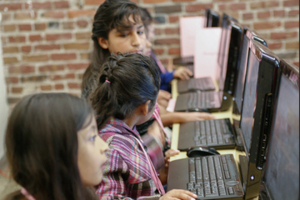
Families across the United States have increasingly turned to digital tools for the purposes of education, but a new set of studies revealed a gap in opportunity to access these tools for Latino families to advance their children’s education. Tablets, e-readers, computers and high-speed internet are accessed unevenly between Hispanics and non-Hispanics, according to the newly released publications by the Joan Ganz Cooney Center at Sesame Workshop.
“Access differed by language, with Spanish-only families experiencing least access to digital technologies. Hispanic-Latino families most commonly accessed educational content through television rather than via the computer, video games, or mobile devices,” according to one of the reports, Aprendido en casa: media as a resource for learning among Hispanic-Latino families. “This points to the need to continue to create strong educational television content for this audience, while developing more mobile content (in Spanish and English) that serves their needs.”
The findings of the studies are striking, but not completely surprising. Some 90 percent of Spanish-speaking families expressed the desire to have more resources and devices that would enhance their children’s’ learning experiences. Today, the overwhelming majority of Latino families say that television is the most prevalent platform used for educational content. Another study, Connecting to Learn: Promoting Digital Equity for America’s Hispanic Families, introduced five realistic goals to buck the trend of digital inequity for Latino families targeted to policymakers and education leaders.
“Goal 1: Create new incentives for maximum digital participation; Goal 2: Establish a digital learning place in every community; Goal 3: Build community capacity: integrate media use into professional practice; Goal 4: Catalyze new public-private, federal-state digital equity partnerships; Goal 5: Empower families to achieve digital equity.”
Surely, the access gap need not be ignored as the Latino-American population continues to elevate into a larger and larger pillar within the greater American economic pool. Latinos will play an integral role in the sustained success of the United States: perhaps these facts, along with these publications, will provide the fodder for policymakers to stimulate significant change to this regard.

Recent Comments